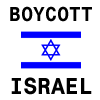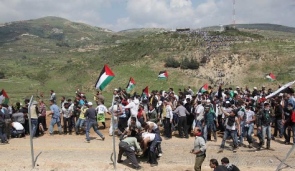EDITOR: Forget about (Jewish) Democracy, now we have Jewish totalitarian theocracy instead!
Now that people cannot fly into Israel without being questioned by the police, and without agreeing to support the illegalities of Israel in the Occupied Territories; now that people who argue for BDS cannot come in without being criminalised by the new (illegal) legislation; now that Palestinian villagers are not allowed to voice their opposition to illegal measures of land theft – now we are at last free from the slogans of the past, which were nevr true – Israel is the Only Jewish Theocracy in the Middle East, and has joined the other theocracies: Iran, Saudi Arabia, Bahrain… Welcome into the Middle East!
Israel’s boycott ban is down to siege mentality: The Guardian
Carlo Strenger
July 12, 2011
The flood of anti-democratic laws that were proposed, and partially implemented, by the current Knesset, elected in February 2009, constitute one of the darkest chapters in Israeli history. The opening salvo was provided by foreign minister Avigdor Lieberman’s Yisrael Beitenu party with its Nakba law, that forbids the public commemoration of the expulsion of approximately 750000 Palestinians during the 1948 war.
Since then, a growing number of attempts were made to curtail freedom of expression and to make life for human rights groups more difficult. The latest instance is the boycott law that was passed on Monday by the Knesset, even though its legal advisor believes it to be a problematic infringement on freedom of speech. This law makes any call for boycotting Israel economically, culturally or academically a civil offence that can be punished with a fine. Any public body making such a call will lose its legal status and will no longer be eligible for tax-deductible contributions.
The law, as Knesset member Nitzan Horowitz from the leftist Meretz party said, is outrageous, shameful and an embarrassment to Israel’s democracy.
Despite the outrage, I will try to analyse the question: what stands behind this frenzy of attempts to shut down criticism? The answer, I believe, is simpler than many assume: it is fear, stupidity and confusion.
It all starts with Binyamin Netanyahu’s political conundrum. He has been under great international pressure to move ahead with a peace agreement with the Palestinians.
Neither his right-wing coalition nor his own Likud party allow for meaningful compromise with the Palestinians. Add to this that Netanyahu is far more of a hardline rightwinger than his sophisticated appearance might suggest. I think he actually believes that the 1967 borders are indefensible, and that Palestinians cannot be trusted.
To play for time, he has been selling the Israeli public the idea that the Palestinians have never accepted Israel’s existence; that the issue is not Israeli occupation of the West Bank and the Gaza blockade, but that the legitimacy of Israel’s very existence is being called into question. While this is true for Iran, Hezbollah and Hamas, it is not true for the free world except for a relatively thin layer of extreme leftists who claim that Israel is by nature a racist, illegitimate state. Netanyahu’s fear-mongering is enhanced by Lieberman, who keeps accusing Israeli Arabs of being a security danger for Israel, and has initiated a number of anti-Arab proposed laws.
The result of Netanyahu and Lieberman’s systematic fanning of Israeli’s existential fears is tangible in Israel: polls show that Israelis are deeply pessimistic about peace; they largely do not trust Palestinians, and in the younger generation belief in democratic values is being eroded.
But this pessimism and siege mentality is not only found in ordinary Israeli voters, but also in the political class. After talking to a number of rightwing politicians, I am unfavourably impressed by their total lack of understanding of the international scene. They have profound misconceptions about the world’s attitude towards Israel, and very little real understanding of the paradigm shift towards human rights as the core language of international discourse. All they feel is that Israel is being singled out unfairly for criticism and that it has a PR problem rather than realising that Israel’s policies are unacceptable politically and morally.
This is certainly justified when it comes to the UN commission on human rights, which has a record of absurd over-emphasis on Israeli human rights violations compared with any number of countries ranging from China to Sudan. But these politicians genuinely do not understand that the international community, for good reasons, is sick and tired of Israel’s occupation of the West Bank, and simply wants Israel to comply.
Add to this a small, but very powerful, group of ideological rightwingers who, on theological grounds, genuinely believe that Jews have a God-given right to the greater land of Israel, including Judea and Samaria, the heart of historical Israel. No Israeli governments except those of Yitzhak Rabin and Ariel Sharon have risked head-on confrontation with ideological rightwingers, among other reasons because of their potential for violence; Rabin, indeed, paid with his life for taking on these apocalyptic, messianic fanatics.
Out of their utter confusion between international criticism of Israeli policies and existential danger for Israel, the more moderate rightwingers look for a scapegoat for Israel’s unprecedented isolation. The Israeli left and human rights organisations are an easy target. Rightwingers claim that these provide the international community with ammunition for criticising Israel, and are trying to silence them.
Existential fear, confusion and ideology create the explosive mix that is drawing Knesset members into the maelstrom of ever more anti-democratic measures, of which the boycott law is the latest, but, I am afraid, not the last installment.
What will the future bring, then? In the short term, I am not optimistic. Ordinary citizens in Israel don’t trust the world; its politicians are richly rewarded for noisy declarations of undying patriotism and for defying the world. The result is a bunker mentality bolstered by melodramatic comparisons to the siege of Masada in the year 72CE that ended in mass suicide. All this is likely to keep the right in power for the time being.
In the long run, I think that Israel will come to its senses. The more recognition, including by the UN, a Palestinian state receives, the more Israel’s political class will come to the conclusion that the price for holding on to the West Bank is too high.
Until then Israel’s democracy will be beleaguered by the right, but it will survive.
Freedom of speech in Israel is intact; the Knesset’s more totalitarian leanings have been kept in check, and I do not expect their attempts to silence criticism to succeed.
Israel is too liberal in its basic structure, and its elites are too sophisticated and too committed to liberal democracy for any attempt to actually turn Israel into a totalitarian state to succeed. It is these elites’ task to sustain the structures of Israeli civil society, until the madness subsides.
EDITOR: A nationalist will remain a nationalist…
So Avneri is against the new law on BDS. But, more interestingly, he is also against the BDS movement – he strongly opposes boycott on Israel… He supports the boycott against the settlements as if the settlements are some private business, rather than the official arm of the Israeli state! If he is against the settleemnts, as he says he is, why is he not against those who put them there, who arm and finance them, who make it all possible? He opposes the phenomenon, but supports the system which created it. Try and bend your head around this kind of logic.
Uri Avnery, will the Boycott Law make you stop calling to boycott the settlements?: Haaretz
‘The Boycott Law turns the dictatorship of the settlers into the basis of Israeli law’.
By Jonathan Lis
Uri Avnery, one of Israel’s most prominent left-wing activists and the founder of the Gush Shalom peace movement, is one of the most vocal critics of the so-called “Boycott Law.” This bill, which has the government’s backing, would impose various sanctions on any person or organization that publicly calls for an economic, cultural or academic boycott of Israel in general or the settlements in particular. It was slated to come up for final approval in the Knesset plenum this evening, though a last-minute hitch may cause the vote to be postponed.
Uri Avnery, will the Boycott Law lead you to stop calling for a boycott of goods from the settlements?
“The boycott law is a sophisticated law. It doesn’t impose criminal sanctions on someone who calls for boycotting the settlements. If it did, we wouldn’t have the slightest problem; we would go to jail. Instead, this law makes everyone who calls for boycotting the settlements liable for paying millions of shekels in compensation to the settlers.
“There is no limit to the sum that the settlers can demand of us in compensation for damages, without their even having to prove it [the damages]. If I call for boycotting the produce of Yitzhar, then every resident of Yitzhar will be able to sue me for millions of shekels in compensation. This could amount to astronomical sums. I think this is a move that has no precedent anywhere else in the world.”
If so, do you fear the law’s effect on protests against the settlements’ existence?
“This law makes it unequivocally clear that it isn’t Israel that controls the settlements, but the settlers who control Israel. How is it possible not to fear this law? We will have to deal with the matter and see how to oppose it.
“This is most the draconian law in the history of Israel. Obviously I am concerned. It’s not a hollow, demonstrative law that is empty of content. It is a substantive law that turns the dictatorship of the settlers into the basis of Israeli law.”
But perhaps imposing boycotts is a problematic and dangerous tool? Perhaps the struggle should not be aimed at harming the settlers’ livelihood or their cultural life?
“There are dozens of boycotts in Israel every day. The religious impose boycotts on nonkosher stores. From their point of view, this is absolutely all right. No one can force them to buy in a store that sells pork or prevent them from announcing the boycott with posters in the streets.
“Vegetarians can boycott stores that sell meat. The secular can boycott religious people whom they don’t like. The religious [i.e the ultra-Orthodox] boycott bus companies that don’t separate men and women. The list is endless.
“All of us at one time boycotted products from South Africa. We boycotted the Soviet Union when it would not let Jews out. In 1933, all Jews boycotted the produce of Nazi Germany. Only one boycott has been banned – a boycott of the settlements. They are holier than all the other holies. We have created a monster here.
“You and I financed the cost of establishing the settlements out of our taxes. With our tax money, the Israel Defense Forces protect these settlements. With our tax money, infrastructure for water, electricity and roads is built on every far-flung illegal outpost. And now we see that the settlers have taken over the state.”
This law bans boycotts against the State of Israel in general, and as part of that, boycotts against the settlements. But you have voiced strong criticism only of the provision regarding boycotts against the settlements.
“Boycotts of the settlements are the reason for this law. All the rest is decoration. The articles that relate to the entire state of Israel can’t be implemented and are stupid.
“The fact that the law was drafted to prevent boycotts of the settlements was stated explicitly during a discussion of the matter by the Knesset Constitution, Law and Justice Committee, headed by David Rotem. No one is trying to hide anything here.
“As for boycotts of the State of Israel, we all oppose that. I’m opposed to it. I’ve fought against it in dozens of lectures and speeches that I’ve given abroad.”
The law does not call for punishing citizens who participate in a boycott, only those who publicly call for carrying it out. In principle, no one would say anything to Israeli citizens who decided, for example, not to buy produce from the settlements.
“That is completely clear. The law does not threaten people who carry out the boycott, it threatens only those who call for a boycott. But calling for a boycott is like any other statement in a democratic country: It is a basic act of political and democratic expression.
“In America, during the black civil rights movement, they boycotted thousands of businesses that discriminated against blacks. Is it conceivable that anyone would punish someone who called for a boycott of this kind? Until not too long ago, there were hundreds of clubs in the United States that would not let Jews enter, and the Jews announced a boycott of them. Is it conceivable that anyone would have prevented this? That would be anti-democratic.
“This law is at bottom anti-democratic. It fundamentally undermines equality: Boycotts of one kind are permitted while boycotts of another kind are banned.”
The attorney general has announced that he will defend the law in its present version if a petition against it is submitted to the High Court of Justice. How do you explain the contradiction between his statement and your claim that the law is anti-democratic?
“The settlers have succeeded in terrorizing the prosecution and the legal system. These are the same settlers and hilltop youths whom we saw just last week blocking roads on behalf of settler rabbis who supported the murder of gentile babies.
“We don’t realize how quickly we are racing toward the abyss – not only toward a state governed by Jewish law, but a state in which the settlers’ rabbis rule. This is a dictatorship pure and simple, and a vengeful one.
“I spent the first 10 years of my life in Germany. I saw how Hitler rose to power. There was no great revolution when he rose to power. Nothing dramatic happened. It was a small step.
“When my father decided to leave Germany a few months after the Nazi regime came to power, all his relatives told him he was crazy. Today, all their names written on the list of Holocaust victims in that city’s town square.
“We are on a fast track to a regime of that kind. All my life I dreaded having to say those words. I always said: ‘Forget it, you can’t compare anything to the Nazis.’ That was a mistake. I’m sorry I spoke like that.”
Rachel Avnery, your wife of 58 years, died this May, and an evening to remember her will take place in Tel Aviv’s Tzavta Theater on Wednesday. In the notice you published, you said she was “a partner to the struggle.”
“I wanted this not to be a memorial service. There was no one who met her who wasn’t impressed by her unique personality. Rachel was a teacher for 28 years and taught only first and second grades. Hundreds of children were her pupils, but no one forgot her. Men of 40 stop me in the streets, as do middle-aged women, and tell me, ‘Rachel changed my life.’
“She was a life partner and a partner to the struggle. We were a single entity for 58 years. When someone loses an arm, he continues to feel as if it were there. I find myself in the same position. When I hear something, I want to run and tell it to Rachel, and then I have to remind myself that there is no one to tell. She had a very, very great influence on me.
“Rachel was not buried. At her request, her body was cremated and the ashes were scattered. Therefore, all those who loved her did not have an opportunity to take leave of her. This evening is going to be a farewell evening.”
The boycott law subverts Israeli democracy: Haaretz Editorial
Knesset members who vote for the anti-Boycott Law must understand they are supporting the gagging of protest in an effort to liquidate democracy.
Today, the Knesset was slated to approve the final reading of the Boycott Prohibition Law, which imposes severe punishments on anyone who calls, directly or indirectly, for boycotting Israel. Inter alia, the law says any person or organization that calls for boycotting Israel, including by calling for a boycott of the settlements, would be deemed guilty of a civil offense. Organizations that call for boycotts would not be entitled to receive tax-deductible donations or obtain funding from the state.
This contemptible law blatantly violates Israel’s Basic Laws. It is couched in vague language: It defines “a boycott of the State of Israel” very broadly, while the definition of causing a boycott is fluid. Under the law, it would suffice for a call to boycott Israel to have “a reasonable possibility” of leading to an actual boycott for the lawbreaker (under the Torts Ordinance, New Version ) to be defined as having committed a civil offense. The lawbreaker would then be deprived of significant economic benefits and would also have to pay high compensation to those purportedly harmed by the boycott.
This vagueness is intentional, designed to conceal the goal of spreading a wide protective net over the settlements, whose products, activities and in fact very existence – which is controversial to begin with – are the main reason for the boycott initiatives, both domestic and foreign. The legislators are thereby trying to silence one of the most legitimate forms of democratic protest, and to restrict the freedom of expression and association of those who oppose the occupation and the settlers’ violence and want to protest against the government’s flawed order of priorities.
The law’s sponsors are also creating a mendacious equivalence between the State of Israel and Israeli society as a whole, on one hand, and the settlements on the other. They are thereby granting the settlers sweeping legitimization.
This is a politically opportunistic and anti-democratic act, the latest in a series of outrageously discriminatory and exclusionary laws enacted over the past year, and it accelerates the process of transforming Israel’s legal code into a disturbingly dictatorial document. It casts the threatening shadow of criminal offense over every boycott, petition or even newspaper op-ed. Very soon, all political debate will be silenced.
Knesset members who vote for this law must understand that they are supporting the gagging of protest as part of an ongoing effort to liquidate democracy. Such moves may be painted as protecting Israel, but in reality, they exacerbate its international isolation.
















